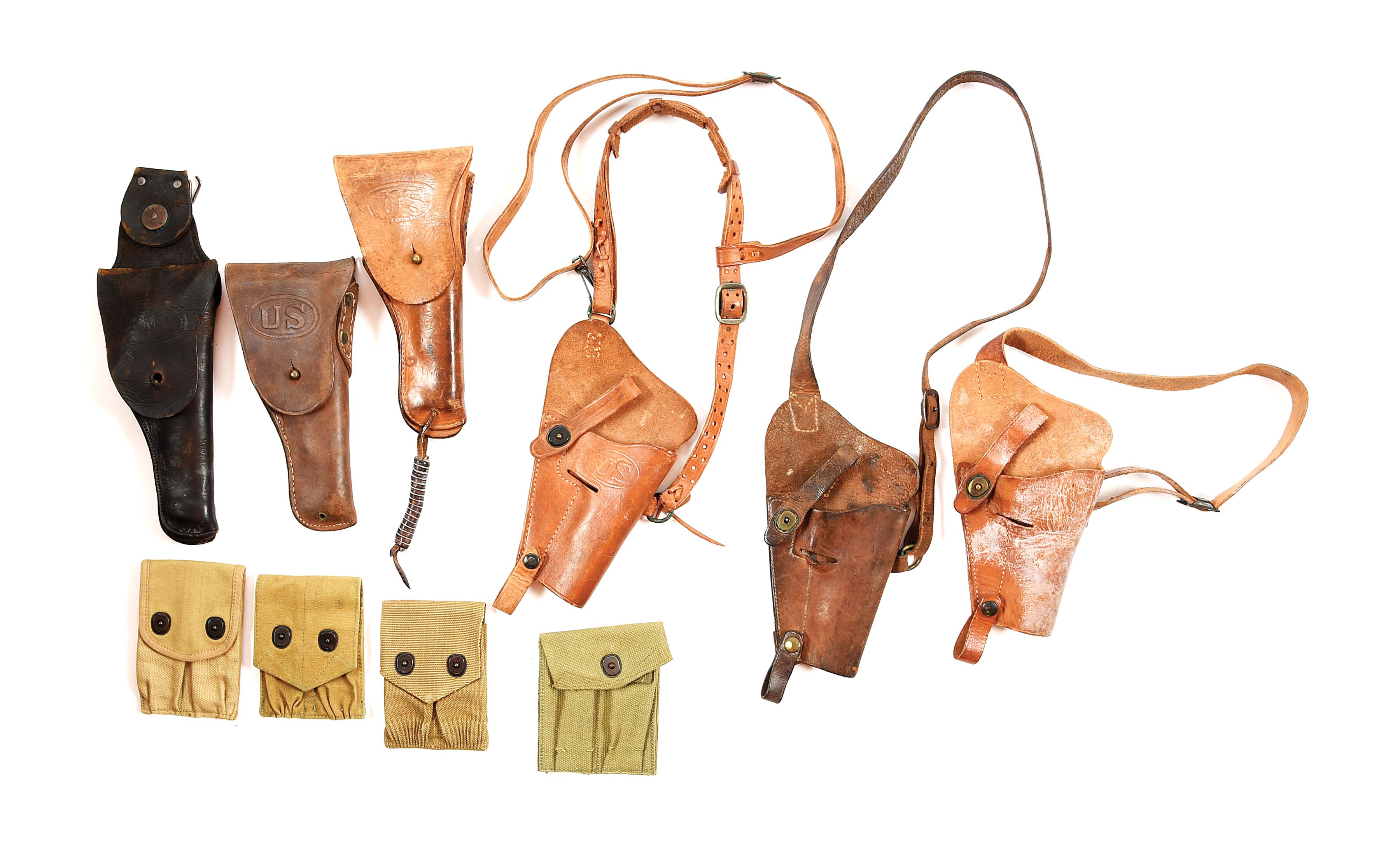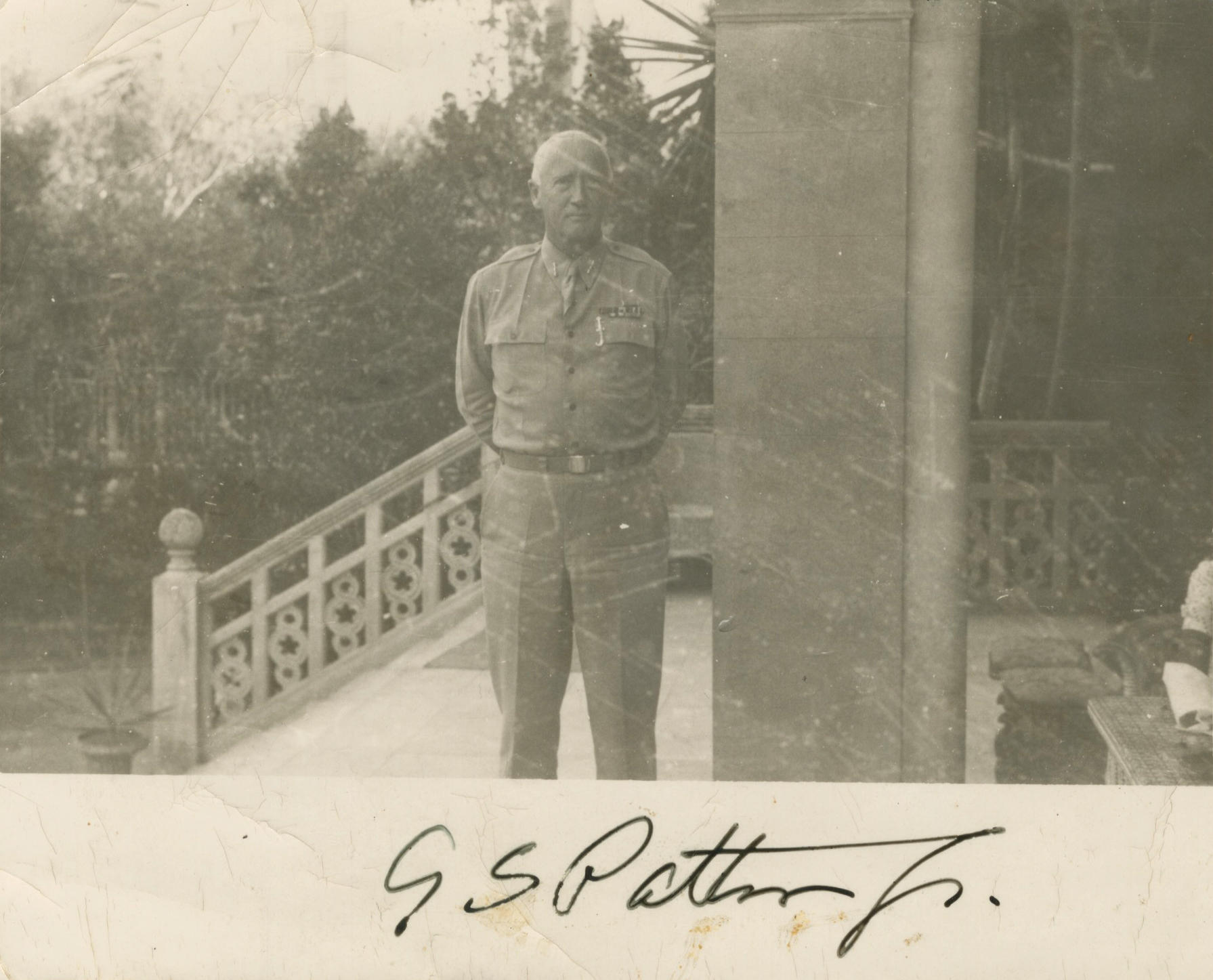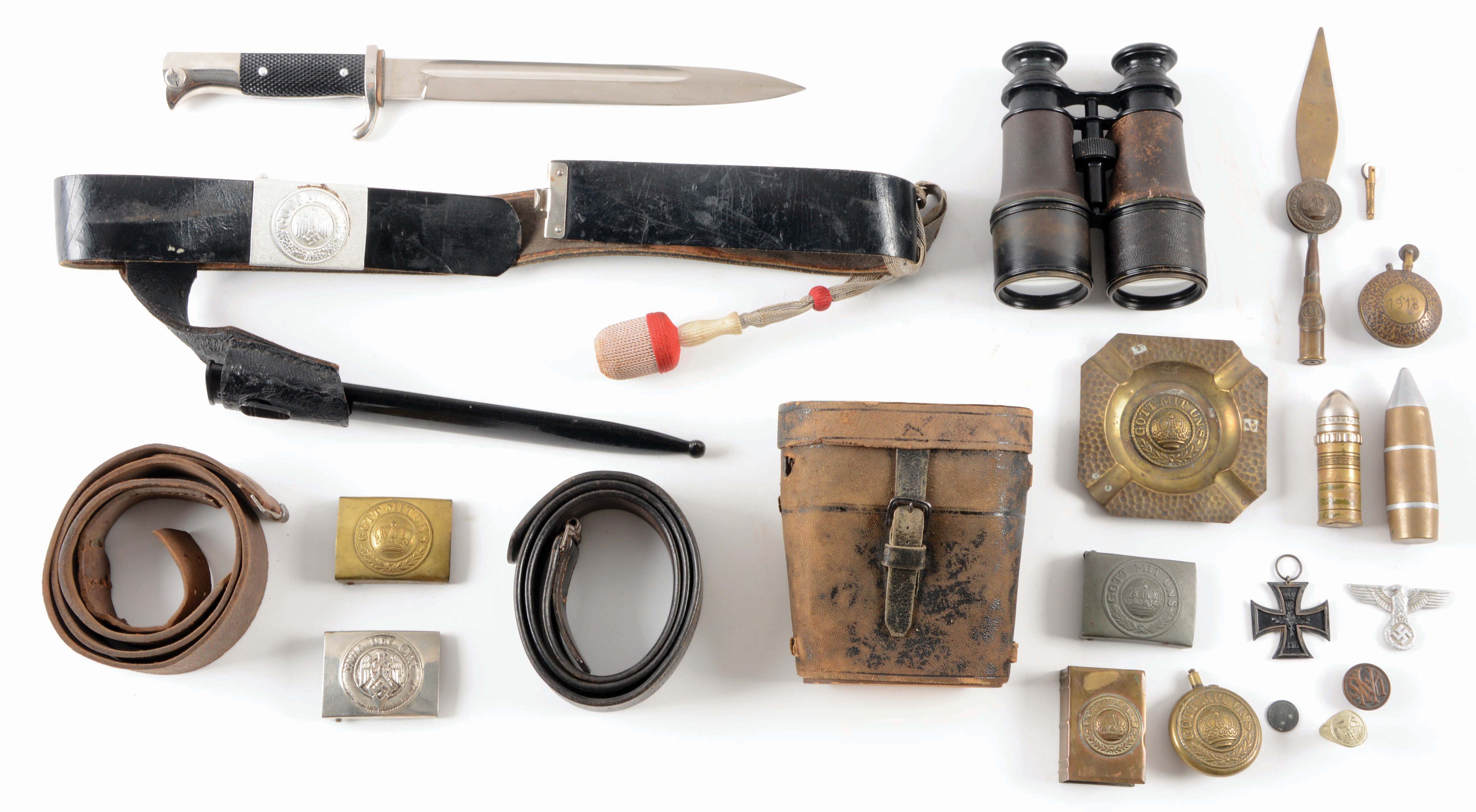Outstanding World War II archive consisting of more than 500 letters (some V-mail) spanning July 1943-December 1945, nearly 500 photographs, and a hand-drawn pencil portrait attributed to French artist Robert Salvagnac, all documenting the service of Captain Charles Henry Foertmeyer., M.D., an American field surgeon who served with the 305th Medical Battalion, 80th Infantry Division, Patton's 3rd Army. Foertmeyer was awarded the Bronze Star and served as the medical head of the German POW camp at Biessenhofen, Germany. Letters are addressed to his wife Virginia Louise Driskell Foertmeyer with some written on confiscated enemy letterhead such as from "Consolato d'Italia," a Hauptschule in Schwanenstadt, and the office of a Nazi Gauleiter. Accompanied by 7 CDs with digitized files of the photographs in the collection, many of which were taken in the summer of 1945 at Biessenhofen and at Bad Worishofen, Germany, the site of a displaced persons camp in the American occupation zone. Born and raised in Cincinnati, OH, Dr. Charles Foertmeyer (1917-2011) attended the University of Cincinnati College of Medicine. He married "Ginny" Driskell on August 7, 1943 at Carlisle Barracks in Carlisle, PA, just a few weeks after his July 16, 1943 enlistment. Foertmeyer landed on Utah Beach in France in mid-August 1944, and witnessed "hard fighting" as Patton's army raced across Europe in pursuit of German forces. His responsibilities included caring for the American troops and setting up hospitals to provide examinations of German prisoners. At Biessenhofen he was responsible for discharging German soldiers, many from the 6th German Army, for return to civilian life in Germany. Foertmeyer's letters to his wife reveal a thoughtful, educated, and dedicated soldier. Limited by censors (with redacting evident in some correspondence), the battle content is minimal. Still, Foertmeyer's observations on warfare and the Germans are insightful and powerful. Similarly, his personal photographs, nearly all of which are labeled, provide a remarkable visual insight into his experiences most notably during the post-war occupation. Photographs document fellow soldiers, landscapes, villages, war-damage, Ebensee concentration camp, displaced people, and German POWS. Together, Foertmeyer's letters and photographs represent a wonderfully thorough record of a WWII doctor's experience. New to combat, Foertmeyer's early letters reflect the ravages of warfare that he was now experiencing firsthand. On Sept 1, 1944, he writes from France: "The French surely are glad to see the Americans. When we pass thru the liberated towns, they pack the sidewalks 10 deep. They wave, throw flowers and carry on hysterically. / There is a small town about a block from our camp, which was just liberated this morning. Parts of it are burning yet. The Germans locked the men and women in the houses and set fire to them. They took the young girls into the fields and raped them. This morning the towns folk are shaving the heads of a few of the women who associated with the Germans." Then on Sept 9, 1944, he offered this assessment: "...early this morning I was in a town where the S.S. troopers had killed every civilian and destroyed every building...I have finally come to the conclusion that the German race should be exterminated - or atleast the nation (as a country) be abolished...I am not getting hard or cruel, but one can only witness the results of such fanaticism and cruelty for so long and then the thoughts of trying to re-educate and reconstruct these personalities, who have produced these crimes, is abolished." Foertmeyer also was keenly aware of the previously inconceivable peculiarities of practicing medicine in a warzone. He offered this thought on Sept 22, 1944: "Honey, you should see some of the ritzy contraptions I have rigged up for giving blood and plasma. I have become quite a shock expert. They call me the 'Plasma Kid' now. / This is a peculiar world here. For instance yeste
Outstanding World War II archive consisting of more than 500 letters (some V-mail) spanning July 1943-December 1945, nearly 500 photographs, and a hand-drawn pencil portrait attributed to French artist Robert Salvagnac, all documenting the service of Captain Charles Henry Foertmeyer., M.D., an American field surgeon who served with the 305th Medical Battalion, 80th Infantry Division, Patton's 3rd Army. Foertmeyer was awarded the Bronze Star and served as the medical head of the German POW camp at Biessenhofen, Germany. Letters are addressed to his wife Virginia Louise Driskell Foertmeyer with some written on confiscated enemy letterhead such as from "Consolato d'Italia," a Hauptschule in Schwanenstadt, and the office of a Nazi Gauleiter. Accompanied by 7 CDs with digitized files of the photographs in the collection, many of which were taken in the summer of 1945 at Biessenhofen and at Bad Worishofen, Germany, the site of a displaced persons camp in the American occupation zone. Born and raised in Cincinnati, OH, Dr. Charles Foertmeyer (1917-2011) attended the University of Cincinnati College of Medicine. He married "Ginny" Driskell on August 7, 1943 at Carlisle Barracks in Carlisle, PA, just a few weeks after his July 16, 1943 enlistment. Foertmeyer landed on Utah Beach in France in mid-August 1944, and witnessed "hard fighting" as Patton's army raced across Europe in pursuit of German forces. His responsibilities included caring for the American troops and setting up hospitals to provide examinations of German prisoners. At Biessenhofen he was responsible for discharging German soldiers, many from the 6th German Army, for return to civilian life in Germany. Foertmeyer's letters to his wife reveal a thoughtful, educated, and dedicated soldier. Limited by censors (with redacting evident in some correspondence), the battle content is minimal. Still, Foertmeyer's observations on warfare and the Germans are insightful and powerful. Similarly, his personal photographs, nearly all of which are labeled, provide a remarkable visual insight into his experiences most notably during the post-war occupation. Photographs document fellow soldiers, landscapes, villages, war-damage, Ebensee concentration camp, displaced people, and German POWS. Together, Foertmeyer's letters and photographs represent a wonderfully thorough record of a WWII doctor's experience. New to combat, Foertmeyer's early letters reflect the ravages of warfare that he was now experiencing firsthand. On Sept 1, 1944, he writes from France: "The French surely are glad to see the Americans. When we pass thru the liberated towns, they pack the sidewalks 10 deep. They wave, throw flowers and carry on hysterically. / There is a small town about a block from our camp, which was just liberated this morning. Parts of it are burning yet. The Germans locked the men and women in the houses and set fire to them. They took the young girls into the fields and raped them. This morning the towns folk are shaving the heads of a few of the women who associated with the Germans." Then on Sept 9, 1944, he offered this assessment: "...early this morning I was in a town where the S.S. troopers had killed every civilian and destroyed every building...I have finally come to the conclusion that the German race should be exterminated - or atleast the nation (as a country) be abolished...I am not getting hard or cruel, but one can only witness the results of such fanaticism and cruelty for so long and then the thoughts of trying to re-educate and reconstruct these personalities, who have produced these crimes, is abolished." Foertmeyer also was keenly aware of the previously inconceivable peculiarities of practicing medicine in a warzone. He offered this thought on Sept 22, 1944: "Honey, you should see some of the ritzy contraptions I have rigged up for giving blood and plasma. I have become quite a shock expert. They call me the 'Plasma Kid' now. / This is a peculiar world here. For instance yeste















Testen Sie LotSearch und seine Premium-Features 7 Tage - ohne Kosten!
Lassen Sie sich automatisch über neue Objekte in kommenden Auktionen benachrichtigen.
Suchauftrag anlegen